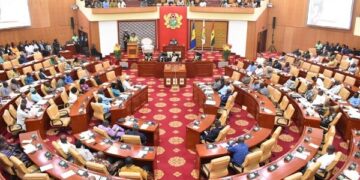Minority Whip, Governs Kwame Agbodza, has criticized the idea of declaring cannabis (wee) for commercial purposes as a solution to the country’s economic challenges.
Expressing his skepticism, Agbodza ridiculed the use of Zimbabwe as an economic model, citing the commercialization of cannabis cultivation as a reason for its purported success.
“All the countries you mentioned, which of their economies have grown better since they began growing cannabis, wee or whatever commercially,” he challenged, questioning the economic benefits of such a move.
Contributing to a Motion on the Narcotics Control Commission (Cultivation and Management of Cannabis) Regulation, 2023 Agbodza expressed concern about the potential adverse effects on the youth.
He stated, “If this was to be a situation where we can control the production and use of cannabis for medicinal purposes then fine, but in our country, we don’t have a good record of policing things that hurt young people,” and expressed doubts about the Ministry’s capability to regulate and control the production and use of cannabis even for medicinal purposes.
The Minority Whip urged caution, stressing the need to address existing problems with the illegal smoking of cannabis before adding to them.
“The law has already been passed, the promoters are claiming there is a long queue of people who are ready to farm wee for export, but I fear for the young people in this country that are already caught up with this,” he emphasized.
Hon. Agbodza argued that if traditional economic drivers such as gold, timber, diamond, and cocoa have not resolved the country’s economic problems, promoting cannabis as a solution is questionable.
However, in defense of the regulation, the Chairman of the Subsidiary Legislation Committee, Dr. Dominic Ayine, contested Agbodza’s claims.
He argued that the strain of cannabis mentioned in the regulation is distinct from the ‘popular or local cannabis’ the Minority Whip referred to.
Dr. Ayine explained that the regulated strain has a THC content of 0.3%, significantly lower than the 30% THC content found in the local strain.
“The subject matter of the regulation is nowhere near marijuana or weed in this case,” Ayine emphasized, countering concerns about the potential for abuse.
He pointed out that the regulated strain would not induce a high similar to the locally used cannabis.
Interior Minister Ambrose Dery echoed Ayine’s stance, cautioning that the regulation does not serve as a license for the cultivation of high-THC cannabis.
He clarified that the regulated strain has not yet been cultivated in Ghana, and, therefore, resistance to the regulation is premature.
Responding to queries from the Speaker, Dery admitted that the regulated strain and the local strain with 30% THC content do not possess distinct characteristics that make them visually distinguishable.
He, however, assured that tests would be conducted on the commercialized produced cannabis to ensure they conform to the accepted THC levels.




















































































